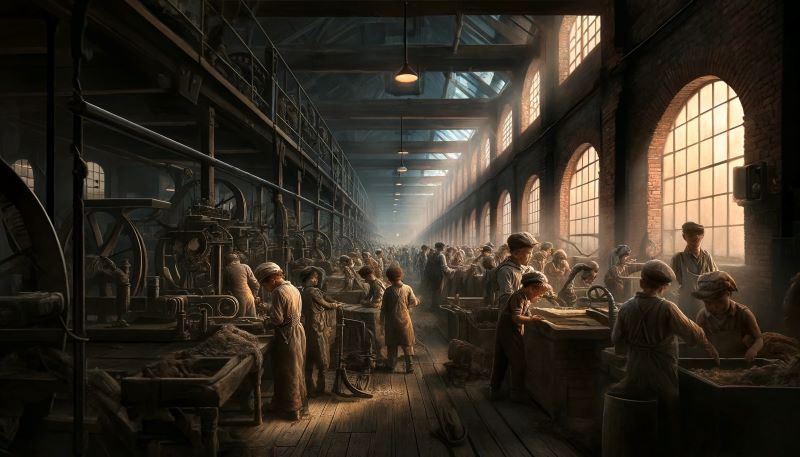Διαθεματική δράση – “Βικτωριανή Αγγλία: Κοινωνική Διαστρωμάτωση, Καθημερινή Ζωή, Υγιεινή και Υγεία”
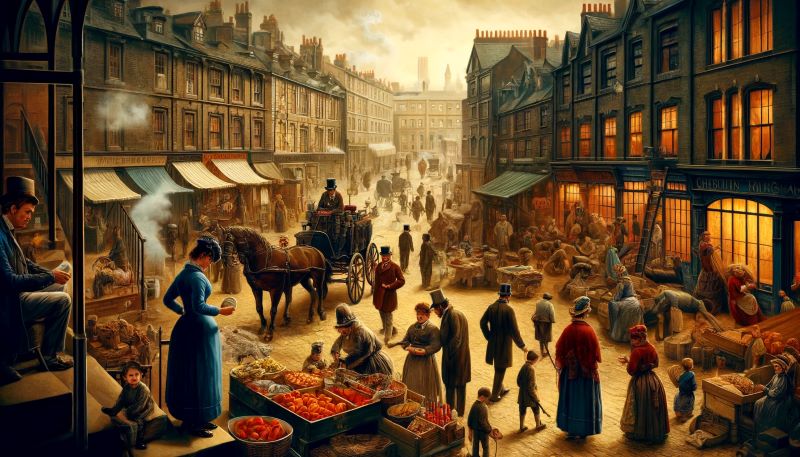
Κατά το Β’ τετράμηνο του σχολικού έτους 2023-2024, οι μαθητές και μαθήτριες της Β’ τάξης του Πρότυπου ΓΕΛ Ευαγγελικής Σχολής Σμύρνης συμμετείχαν στη διαθεματική δράση “Βικτωριανή Αγγλία: κοινωνική διαστρωμάτωση, καθημερινή ζωή, υγιεινή και υγεία”, η οποία υλοποιήθηκε μεταξύ Αγγλικών, Ιστορίας και Χημείας από τους/τις καθηγητές/-τριες Ειρήνη Αρναούτη (καθηγήτρια Αγγλικών), Γεώργιο Θώδη (φιλόλογο) και Χρυσή Αγγελίδου (χημικό). Μετά την ολοκλήρωση της δράσης οι μαθητές/-τριες κλήθηκαν να καταθέσουν μία δημιουργική εργασία εμπνευσμένη από τις θεματικές που μελετήθηκαν στο πλαίσιο της συγκεκριμένης δράσης στην αγγλική γλώσσα. Παραθέτουμε κάποιες επιλεγμένες εργασίες που ξεχώρισαν τόσο σε πληρότητα περιεχομένου, όσο και σε αρτιότητα δομής και χρήσης της αγγλικής.
The Autumn of Terror
by Angelos Oikonomopoulos & Albert Bechar (B3)
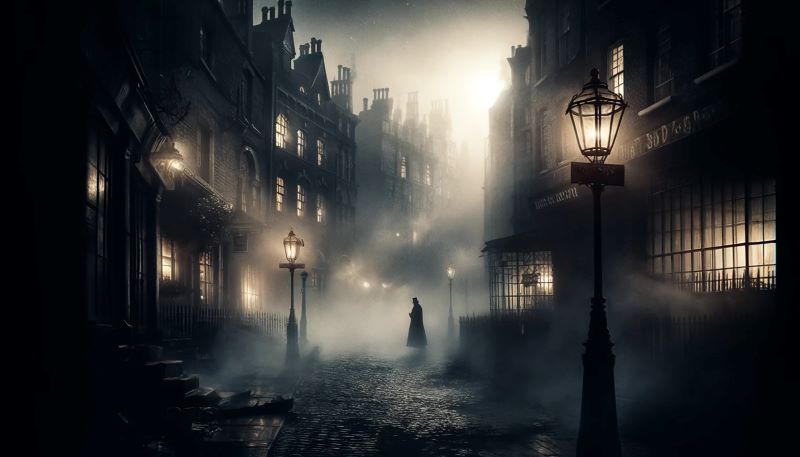
The First Murder
London, 1888. It was a calm, foggy day. The sun was setting and the shops were closing. This autumn was a cold one. The homeless people in the streets of Whitechapel were begging the shop owners to let them sleep inside the stores. They couldn’t handle to sleep in the streets for another night. The sun disappeared and Whitechapel was shrouded in an ethereal mist that clung to the streets just like a ghostly veil. The usual hustle and bustle of the area turned into a silence, which would get interrupted by the echoes of distant footsteps or dogs barking at cats passing by. The fog was so dense you could almost not see next to you. The old Victorian buildings built one next to each other seemed so quiet. Doors locked, lights off. The only source of light was the gas-lit lamps, which were flickering on the main road. Suddenly, a scream. Who was it? Where did it come from? Did anyone hear it? A shadow figure disappears into the darkness, nowhere to be found.
Whitechapel in Shock
The sun rises, the windows of the houses open, the factories start working, the air starts to get a darkish color from the fumes. A typical morning in Victorian London, or so does everyone think. The crowd starts to gather around a small alleyway near the main road. A dead woman is found. The cobblestone path has gained a red colour from the dried blood of the victim. Kids are kept away from the scene. Some people can’t be bothered, their life is so bad that maybe death is a better option. Others are shocked, thinking who could have done something like this. The victim is 39-year-old Martha Tabram, a local prostitute who wandered the streets almost every night. The police has reached the crime scene and started writing a report about the murder. 39 stab wounds. A savage act, no mercy to the victim. No one in the police department has seen something like this before. An act of revenge? It can’t be that cruel, everyone thought. The local newspapers are very quick to write about the murder. “WOMAN BRUTALLY HACKED TO DEATH”, “HORROR IN WHITECHAPEL”, “WOMAN BUTCHERED AT NIGHT” are some of the headlines. The body is collected by the police and everyone returns to their ordinary life.
The Root of Evil
Time passes with no other surprises and the night is coming once again. The heart of Whitechapel is full of people. Hidden away in a narrow street stands a house with no owner. Doors closed; windows shattered. Everyone thinks it is abandoned. Inside? Pure insanity. The furniture is covered with dusty white sheets. No lamps, only some candles. In the center of the house, a library with hundreds of books. Next to the library, an armchair. A tall, menacing man is sitting in the armchair. His coat covered in blood. A top hat sitting next to him, on a table. He has been sitting alone in the darkness since the previous night. On the wall, a large map of Whitechapel with insane detail; every alleyway, road and house are depicted. His eyes show no emotion, his hands rest on his knees, inside his mind only one thing, murder. The room shows a sinister energy. He hears voices behind him, in front of him, next to him coming from the walls, telling him: “You liked it, didn’t you?” “Do it again.” “Murder.” He is once again awakened. He stands up, grabs his tools and starts walking towards the door. The weight of his sins drags him down to the floor, but he does not stop. He is ready to do it again.
The Final Night of Terror
The murders continue and the police seem to gain no clues on the murderer. The people of Whitechapel are petrified. The people start calling the murderer “Jack the Ripper”. Whitechapel turns into a horror hide-and-seek. But who is the seeker? Jack or the police? 29th of October, 2 a.m. A police officer starts his daily patrol on the cobblestone alleys of Whitechapel. The city is gripped by fear. As he turns a corner, he sees a shadow figure lurking. “Come here!” he shouts. The figure doesn’t respond almost like he didn’t hear him and suddenly starts running. The sound of the loud footsteps is followed by a shocking scream. The police officer arrives late to the scene. A scene so gruesome; he almost collapses after seeing the mutilated body of Mary Jane Kelly. This is the closest attempt of the police to catching Jack the Ripper. It is almost like he was playing with them. For months, the district had been paralyzed by him as he left behind a trail of brutal murders. However, this was the final night of terror. The murders just stopped. No one could explain it. Speculations and conspiracy theories started to rise about the identity of Jack the Ripper, with some people even claiming that he was devil himself or that he had superpowers. The police had five main suspects; however, they couldn’t make a final decision with no clues in their hands. With the murders stopping, the case of Jack the Ripper was finally closed but the population of Whitechapel was left with the question.
What happened to Jack the Ripper? The truth is his own insanity conquered him. His line between reality and illusion blurred. The screams of his victims were echoing through his head just like a haunting melody. A sadistic, cunning figure with such a deep hatred for human beings that he himself couldn’t handle at the end. Overwhelmed by the guilt and horror, with the same sharp blade that he savagely butchered his victims, he ended his own life and put an end to his misery. A mysterious ending of a story about a menacing figure, a ghost, that lurks in the shadows of Whitechapel and is ready to murder whoever dares to pass by.
When life becomes crime
by Stavros Maramenidis & Vasileios Papadopoulos (B3)
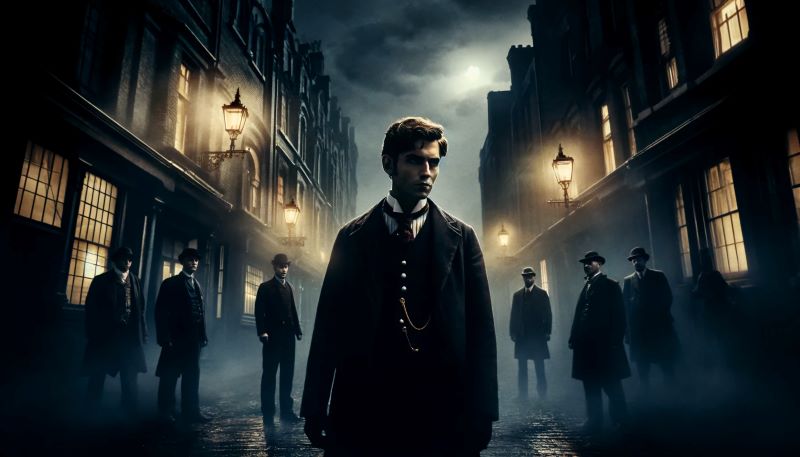
It was a cold night of December 1887. Everyone was preparing for Christmas, while pain and fear ruled over a poor and lifeless house in Watford. Little Arthur and his mother Margaret were sitting on the dinner table, crying, knowing that they were going to spend Christmas on their own. It had not been over a week since George, Arthur’s father, had been killed in an accident, while working in the local coal mine. It was just then when Margaret made the difficult decision to move out to London, leaving her painful past behind and looking for a better life, for her and for her 10-year-old son, who she did not accept to be raised in such poverty. Knowing that people in town would rush to take advantage of the situation, she took her few belongings and any money her late husband had left for them and, along with her son, left Watford and headed towards central London.
Arriving in the sprawling metropolis of London, they found themselves in a world vastly different from the one they were used to. The streets were full of life and activity, with each corner unveiling something new. Determined to make ends meet, Margaret sought out work wherever she could, taking on different kind of jobs in order to put food on the table and a roof over their heads. But one day, things were to change, once and for all. Margaret had been working part-time as a housemaid in the house of an aristocratic family, for about a week and had already formed a bond with the family. Her master, though, was in great debt to a man named David Aarons, well-known in Whitechapel for his tangles with the police. He had seen Margaret and had been informed about her situation and had “kindly” asked Mr. Collins to give her to him, as a small repayment of his debt. Before she had time to realize what had happened, Margaret was found in a car, heading for a new house with her son, even though this was not to last much longer either.
David Aarons was a cold man and a ruthless criminal. Little Arthur proved to be a hassle for him and his time there did not last long. One night, he ordered John, his loyal servant, to kick him out without Margie taking notice. The next day the two were separated for the first time and that made Margaret dead inside. In the following days, Margaret found herself drawn deeper into Aaron’s world of crime and deception. Despite her growing unease, Margaret knew that she had to play along if she wanted to survive. But as the weeks turned into months, she began to question the choices she had made; however, it was already too late.
Arthur, on the other hand, was suddenly abandoned in a huge, hostile city. But Arthur had known the harsh realities of life from a very young age, and he refused to quit and let poverty define his future. He quickly accepted his situation and set a goal to become a powerful man and to get his mother back. He knew it would not be easy, but he needed to survive and wanted to ensure a worth-living environment for him. Whitechapel’s poor and dirty streets were definitely not the place to start but he was desperate and in great need of food and a place to sleep. Life brought to him an opportunity under the name of Carl Watson, and he took it.
At first, his new master seemed to be an angel to his eyes, and they formed a bond really fast. He was like a father to him. At the age of fourteen, Carl began to bring Arthur with him when he was out for business and made him part of his family. Arthur quickly became used to the business and was a respected young man. Falling in the world of crime was not a choice but the only path for him.
Arthur was now 20 years old and had risen through the ranks. He was now the right hand of Carl and soon he was to take over some of his businesses, whenever Carl would decide that was appropriate for him to step aside. Despite his success, Arthur never forgot the promise he made to himself as a young boy: to reunite with his mother and provide her with a better life. So, some months later, after Carl had finally decided to let Arthur assume his new role, tensions between the two families of Aarons and Watsons were up. That’s when Arthur took advantage of the situation in order to get revenge from David for his mother and himself.
The night of the revenge was fraught with tension as Arthur and his men launched their attack on David’s estate. Despite the odds being stacked against them, they managed to kill him, and Arthur emerged as the sole kingpin of Whitechapel. The next day, Arthur set out on a quest to reunite with his mother, only to find out that she had passed away several months before…
Arthur was now one of the most powerful street gang leaders in the whole of London but still he had not been able to save his mother and fulfill his goal. This traumatized him, leaving him unsatisfied for the rest of his life.
This is the story of Arthur Watson (Hughes), kingpin of Whitechapel…
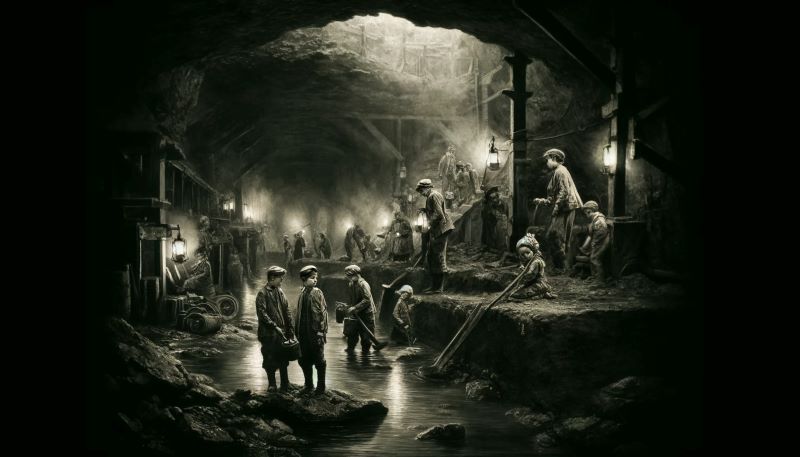
“I am a Woman”
by Kalliopi Anagnostopoulou, Anastasia Antoniou, Dimitrios Dalamagkas, Nikolaos Kleftogiannis (B2)

I am a woman.
“Man must be pleased;
but to please him
is a woman’s pleasure.”
That is what they say, at least.
What else could a woman ask for?
It is her duty, after all,
to love, to honour and obey.
To obey, like a slave.
Lady-like and quiet,
modest and pure.
That is what a woman is.
Is that who I must be?
I am a woman.
But why am I here?
To live a life of my own?
I used to believe that.
“The crowning achievement
of your life”, my man said,
when I bore my first child.
But no one asked, no one cared
about what I truly wanted.
Life is easy for men.
I envy the freedom they possess.
They own the land, the wealth.
I have nothing to my name.
After my marriage,
all my possessions
belong to him.
Even I belong to him.
I am a woman,
but I wish I were a man.
I long to walk with purpose,
with pride and power;
to feel the weight of privilige
on my tired shoulders;
to speak without fear
of being silenced;
to be respected
and not confined
like an animal in its cage.
To experience life,
however short it may be,
the way I truly want.
I am a woman.
Sometimes at night
I struggle to sleep.
At those times
I look at the stars.
They are all I have for me.
Only they provide me
with comfort.
Under the starlight I wonder:
Why did God make me a woman?
When did I stop being a human?
Polluted London
by Ioannis Germanoulidis & Georgios Koutroulis (B2)
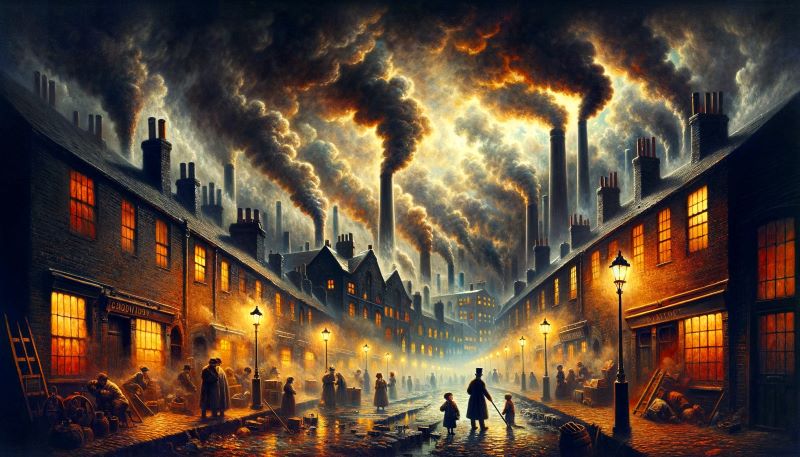
In London’s streets of yore, where gaslights gleam,
Amidst the fog, pollution’s toxic stream.
Blackened skies cloak the city in despair,
As soot and grime choke the weary air.
Factory chimneys belch their noxious fumes,
A toxic symphony that forever looms.
Through cobblestone alleys, the filth does creep,
A veil of darkness where sunlight can’t seep.
The Thames, once a lifeline, now a cesspool vile,
A graveyard of waste, mile after mile.
The stench of decay hangs thick in the breeze,
A testament to man’s heedless decrees.
Children cough and wheeze in the smog-filled air,
Their innocence tainted by a burden unfair.
Yet amidst the gloom, a glimmer of hope,
As voices rise against pollution’s cruel scope.
For even in Victorian London’s plight,
There’s resilience in the human fight.
To cleanse the air and heal the land,
A brighter future held in our hand.
Captain Thomas
by A. Skartsilis, S. Georgaras, V. Sarafoglou & G. Tsolakis
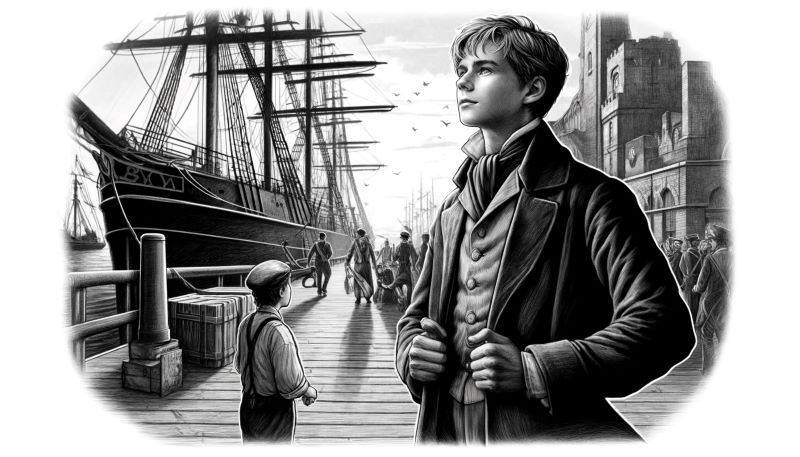
Once upon a time, there was a little boy named Thomas. Although Thomas’ family wasn’t very rich, he was relatively happy and enjoyed his time at the village. All three of them had an ordinary life. Luckily for them, they had enough food on the table every day and a house to live in.
His life changed, however, when both of his parents died of cholera. He was lucky and he wasn’t affected by it. When he heard that he was going to continue life on his own, he held back his tears, knowing he would have to find a way to survive without his parents. He had no friends, however, nor did his parents from what he knew of.
Left with no other option, he decided to try to make his own money, and get his own job. The very next day, he searched for a field which he could work in. After three exhausting hours of searching, he got lucky when he found a middle-aged man on his way to a huge field. “Do you know anyone here, sir?” he asked. “Of course I do, I own the place” replied the man, “but what brings you here?” “I’m trying to find a job,” said Thomas. “In that case young man, you are very lucky, since you are exactly what we need here.” the man told Thomas as a smirk appeared in his face. “Come in, and we’ll figure everything out!” Ecstatic, Thomas made his way in one of the small houses located in the field. “What’s your name young man?” “Thomas”, the child responded. “Very well, Thomas. From now on you will be working for me. You will be living in this house, having nothing to worry about, since providing you with food and water is my responsibility. Over there are your roommates, Bob and Billy. You will have to work daily, from 6am to 10pm. Is everything clear?” finally asked the man. Thomas nodded without understanding what he was getting himself into.
Only four days into working, Thomas was exhausted. His arms and back hurt from carrying various weights. His legs did too, from running back and forth the large fields to provide the elder people with water. However, when he asked the owner of the fields to leave, he got yelled at and hit for not doing what he was supposed to. It was only then when he realized what he got himself into… He was determined however not to give up, so he continued working hard. Soon he got to meet his roommates better. It turns out both of them came from broken homes, and hated the fields as much as he did. “We can’t go on for long”, said Billy. “Either we’ll get tired out and fired, or we’ll die. We must find a way to flee.” All three of them, however, knew that was no easy task. The owner had dogs guarding the gates and pressured them as much as one could imagine. The three children planned their escape every day for about a month. Every night, they would gather at their house and share everything they knew and learned about the place with the others. Though they hadn’t figured the conclusion yet, they had lots of useful information which would help them. They knew when the gates opened, at what time the last worker stopped working, when the night guard went to sleep. They also realized the importance of the issue. It was a do or die situation, and they only had one chance.
After 50 more days of hard work and dedication, they figured out a way to escape. It was very risky and the three of them were in need of good luck. There was only one problem. They needed someone to help them; someone to distract the guard and give plenty of time to the children to escape. After thinking and thinking, they concluded that the person they needed was Mario. Mario wasn’t very bright and that was very helpful, since under no circumstances should he figure out what the plan was. The plan was simple. During the night they would have Mario scream and shout to distract the night guard. The guard who would just wake up, would forget his keys on the little table he had and would run to investigate. Then the children would have to cooperate, using every second of the distraction they had to unlock the gate and run to safety. Everything was carefully planned, since every little detail mattered.
It was a cold and windy night and the thick clouds had covered the moon leaving the land below in complete darkness. The conditions were perfect for the escape. Everything worked perfectly. Mario started his shouting just on time and, when the guard left in a hurry, Thomas ran to the gate, grabbed the keys, and unlocked the door with shaky hands. As he opened it, they all ran as fast as they could on the dirt road, running to their freedom, even if they didn’t know where to go or what to do.
After their escape, they walked for days and days on end under rain and cold. They followed the road and hoped for their supplies not to end soon. And they didn’t! Just when they started to get truly exhausted, long chimneys appeared in the horizon. Not long after, they were in London, with nothing but their clothes and their dreams.
They were amazed by the city and how different it was from the small town they had been living in. They started thinking of their future together, as friends. There, Thomas saw the river Thames for the first time in his life. He became interested in the boats on it, which transported all kinds of goods from around the world. He told his friends: “One day, I’ll become a captain on one of these boats!”. His friends then cheered up for him.
However, the kids couldn’t find a job right away. So, after some days of begging in the streets, Thomas decided to do what he knew was right for him. He went to the port and started talking to everyone he could find that could help him become a sailor on one of the ships. He spoke to some people and they all rejected him, because they “didn’t need a sailor”. He was ready to leave and get back to his friends, when a big ship arrived. He immediately went and found its captain. He asked about him becoming a sailor and the captain wasn’t sure in the beginning. “You don’t have any experience, little boy, and we can’t afford another sailor”, he said. Then the boy got down on the floor and begged the man for a place: “I will work for free for some time and if you are satisfied with me as a sailor, a small payment every month is enough for me. If not, you can abandon me wherever you want in the sea. I just want some food and water every day”, Thomas told him. The captain was amazed by this child’s passion, so he agreed. “Be here tomorrow morning”, he told Thomas. The child went back to his friends and told them everything that had happened. They were really happy about their friend, however they didn’t want to leave him that early. The other morning the three of them went to the port. When it was time to leave, Bill and Bob said goodbye to their friend and he shouted from afar: “I will be fine!”
He wasn’t lying. Thomas became the best among all the other sailors and he quickly started earning money. In his life, he did many trips around the world as a sailor and he managed to become a captain when he grew up, making lots of money. One day, when he came back from a trip, as he was on the port, he saw a poor kid coming to him with a spark of passion in his eyes. He knew… ”Hello sir, I am Jack and I am struggling to find a job. Could I join you, please? I am ready to do whatever you order me”, the boy asked him. Captain Thomas held back his tears. “Sure, young man, you will work as a sailor and you will be paid enough. Be here tomorrow morning.”
Arthur Carter
by Paraskevi Melina Dionysopoulou, Dimitrios Magiafas & Dimitrios Ziakas
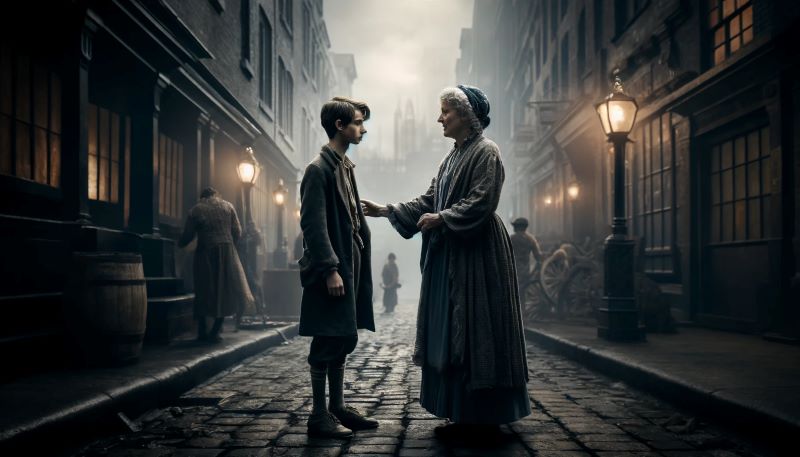
Arthur. Yes, that’s me. Arthur Carter. A 14-year-old boy working at a warehouse. Working as a kid under the warehouse’s conditions has proven to me that the world is just built to praise the wealthy and demoralise the poor – in every way possible.
I do not know where I come from, nor do I know where I’m headed to. The warehouse officials claim that my parents’ deaths were “accidents”, but I hardly believe them. They must have kept them starving and underpaid, only to have them be killed from the harsh working conditions eventually. I have to get out of this place, but how? I’m just a kid after all, there’s nothing I can physically do. Beatings are always in line, no matter how well you do your job.
I woke up as the sun started rising, at about 6 in the morning. I got dressed and hurried to work. On my way there I heard some rumours about some “Poor law”, which essentially meant us kids were going to be treated properly. Yeah, as if… Kids? Treated properly? Definitely the most unfathomable combination I’ve ever heard of thus far.
After I finally arrived at work, being 6-7 minutes late, the boss was furious at me. “Ye’r half an hour late! Ye better start pickin’ those legs up or ye’ll end up like a rat in the sewers!”, he yelled. Nothing new to my ears, I keep hearing the same line repeatedly every Thursday. Thursday just seems like his bad day.
No sooner did he finish ranting at me than he started whipping out the workers that were beating hemp. The poor lads, they are always in tough luck. They’re not doing anything wrong; as much as their health can work for, at least… I tried talking to ‘em some weeks ago, they can barely speak or walk. They are on their last leg and they’re still working and enduring the boss. Commendable, I daresay.
I got to work. What do I do for work? Well, “as a kid you have thin fingers, and therefore can pass the needles from small holes easily”. Can you guess what I do yet? I make carpets. Just your ordinary job for a kid in the 1800s. The atmosphere at the warehouse is suffocating, both literally and metaphorically. There’s no proper air ventilation, and no proper hygiene either. “Why do you have to endure this?”, I keep asking myself. The answer… well… it’s very straightforward. I can’t get out of here.
…Or so I thought. Last time I checked the time, it was 4 in the morning, and I was 22 hours in my shift. Things weren’t looking good for me, as I had started to feel numb and exhausted. I obviously couldn’t reach out to the boss, or else I was in for a good beating, since it was a Thursday, like I said. It must’ve been my 60th carpet or so, when I heard a loud explosion from the back of the warehouse. I quickly went to investigate; …with the little strength (if you can even call it that) I had remaining.
To my surprise, the polishes we had stored for the carpets had caught fire. Where the explosion came from was as surprising to me as it was to you, although I quickly realised that pretty much the entire storage room was up in flames. I called an adult and paid no more mind to the situation.
Next morning, we heard that the boss was found lying dead in the storage room, having been burnt from the flames. When I first heard this, I thought I was living in a dream. Never would I ever imagine that this would occur to our boss in our warehouse. Some of you might think, how did the death of the boss make escaping easier? Well, everyone was at a disarray. Including the workers. The reason was they were so used to the harsh conditions that they weren’t stable enough while adapting to the less hostile environment.
A new boss was quickly found and replaced the old one, but by the time that had happened, I was gone. I had vanished, never to be seen again by any of the workers in the warehouse. I safely assumed that they would never come looking for me, since they probably didn’t realise I was missing after they recuperated from the shock.
I spent days wandering the streets, searching for food and water. I looked more pitiful than I dressed, but people never thought I was an orphan exactly because of my clothing…
Sunday. Two weeks after I escaped that rotten warehouse. I’m hungry, my stomach’s rumbling loudly, and I just can’t seem to find any food lying around. A young lady comes up to me and offers me a snack and temporary shelter. Just who is she, offering shelter and food to kids she finds on the street? Not that I will complain though…
She introduced herself as “Margaret”. Quite the name.
“Me? Oh, I’m just a lowly widowed housewife, lost my husband in a working accident and my son was taken away from me when he was still a baby. He was my only hope in this world, and after I lost him I fell victim to depression. Eventually I grew out of it, and made it my goal to protect, albeit temporarily, any child that I can, until I find them a permanent place to stay, safe from all harm, starvation, and poverty.”
“Intriguing, what was your son like?”
“The most beautiful kid in the world I daresay, one of the most intelligent kids I’ve seen, and this isn’t mother bias. He was mature and intelligent, way more than all kids his age.”
“What was his name?”
“Arthur. Arthur Carter. He had the brawns of my husband and the brains of my own.”
“I see. Why’d you take me in?”
“Didn’t I just say? I want to protect you. From everything that can hurt you. Until you can find a permanent lodging, safe and sound. Without the fear of hunger.”
“Why, I think I’d fit quite well in this little house, mother.”
